Donald Trump campaign plans $140 million ad buy

Donald Trump‘s campaign is planning for what it says will amount to $140 million worth of advertising from now until Election Day. The total, if executed, would include $100 million in television airtime and $40 million in digital ads, according to senior communications adviser Jason Miller. The plan represents a new approach for the billionaire businessman, who has repeatedly bragged in recent weeks about how much less he’s spent than Democratic rival Hillary Clinton and seemed to rely heavily on free media coverage of his large rallies. Through this week, the Trump campaign has put only about $22 million into TV and radio ads for the general election, according to Kantar Media’s political advertising tracker. Clinton has spent more than five times as much on those kinds of ads, $124 million so far. Trump’s new ad buy will include 13 states, from key battlegrounds such as Florida, North Carolina, Ohio and Pennsylvania, to new targets of Maine, New Mexico and Wisconsin, Miller said. About $40 million of the ads will play on national TV, he said. That averages to about $16.7 million per week in TV ads; Miller said the first $15 million ad buy was made Friday, although media buyers and services such as Kantar Media didn’t immediately see evidence of that. Clinton’s ad reservations going forward total about $11 million per week, but her campaign can add to those buys at any time. Trump’s advertising plan costs more than his campaign has in the bank, meaning he needs to dip into his own pockets or continue raising major money. As of Sept. 1, the campaign had about $50 million in cash, though in a news release earlier this month, the campaign said it had $97 million in cash when including his joint accounts with Republican Party allies. Trump has continued to experience strong fundraising online this month, campaign aides said. Miller said upcoming national television ads would focus on Trump’s key campaign themes, such as the economy and law and order. The local ads, however, are expected to focus on ways Trump’s policies might benefit local communities and families, Miller said. Republished with permission of the Associated Press.
Hillary Clinton, Donald Trump buff foreign policy bona fides on debate eve
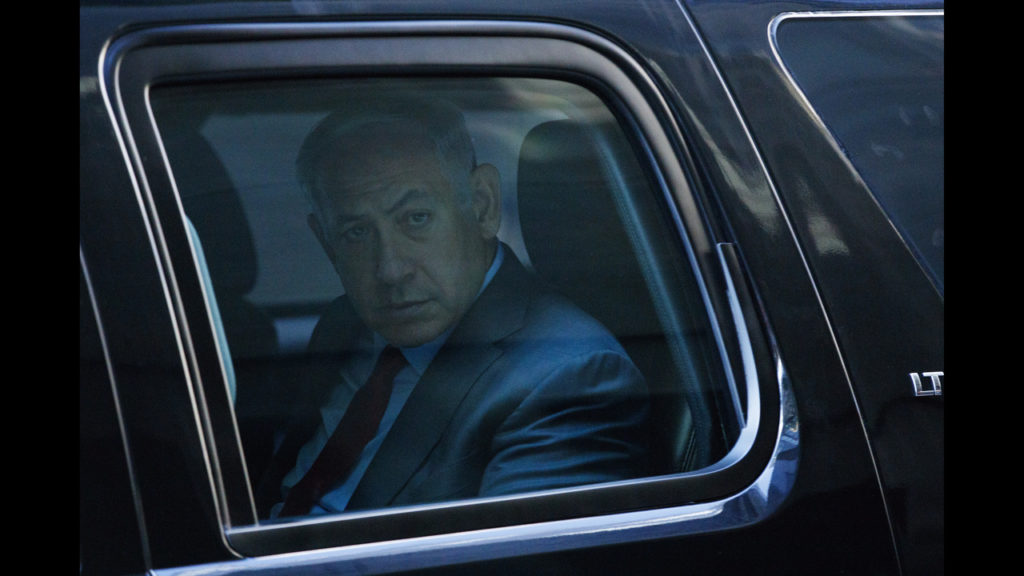
Hillary Clinton and Donald Trump were meeting separately with Israeli Prime Minister Benjamin Netanyahu Sunday, giving the each candidate fresh bragging rights about their knowledge of foreign policy and readiness to lead the nation on the eve of their first presidential debate. Trump and Netanyahu discussed “at length” Israel’s use of a fence to help secure its borders, an example Trump frequently cites when he’s talking about the wall he wants to build between the U.S. and Mexico. “Trump recognized that Israel and its citizens have suffered far too long on the front lines of Islamic terrorism,” the campaign said in a statement. “He agreed with Prime Minister Netanyahu that the Israeli people want a just and lasting peace with their neighbors, but that peace will only come when the Palestinians renounce hatred and violence and accept Israel as a Jewish State.” Clinton was expected to meet with the prime minister later in the day, also in New York. The meeting was designed to put Israel on good footing with the next U.S. president. But it also served to showcase the candidates’ expertise in foreign policy in the shadow of their first debate Monday, six weeks before Election Day. Clinton, a former senator and secretary of state, often says that Trump does not know enough about the world and lacks the temperament to be president. Trump has argued that he has extensive experience with foreign policy through his career as a business executive and blames Clinton for many of the nation’s stumbles in foreign policy. Meanwhile, the candidates deployed their top supporters to the Sunday shows to take early jabs at their opponents and lower expectations for a showdown expected to draw 75 million viewers — many of them disenchanted with both candidates, the least-popular presidential hopefuls in history. Facts and who will determine them during the 90-minute debate seemed to be a top concern of the campaigns’ strategists given Trump’s habit of saying things that are untrue and the public’s general distrust of Clinton. Robby Mook, Clinton’s campaign manager, told ABC’s “This Week” that he is concerned Trump will continue his habit of sometimes saying things that aren’t true and still get a passing grade. He called on moderator Lester Holt to correct any inaccuracies made by the candidates. But Trump’s campaign manager, Kellyanne Conway, said it’s not the job of debate moderators to fact check. Trump’s vice presidential running mate, Mike Pence, meanwhile, said that Gennifer Flowers will not attend the debate. Trump had tweeted that if frequent Trump critic Mark Cuban attended the showdown, he’d put Flowers, allegedly the former mistress of Clinton’s husband Bill, in the audience too. Conway said that Flowers had a right to be there if “somebody else gives her a ticket.” But Pence drew a harder line. “Gennifer Flowers will not be attending the debate tomorrow night,” Pence said on “Fox News Sunday.” The candidates were focused on other matters Sunday. Trump’s campaign said that during his meeting with Netanyahu, the Republican presidential nominee promised, “extraordinary strategic, technological, military and intelligence cooperation between the two countries” if he’s elected. The press was barred from covering the meeting between Netanyahu and Trump, but Trump’s campaign said in a statement that the men, who have known each other for years, discussed “many topics important to both countries,” including “the special relationship between America and Israel and the unbreakable bond between the two countries.” Among those topics: the nuclear deal with Iran, the battle against Islamic State militants, military assistance provided by the U.S. to Israel and other security issues. Republished with permission of the Associated Press.
Gold cards and red hats: A Trumpian approach to fundraising
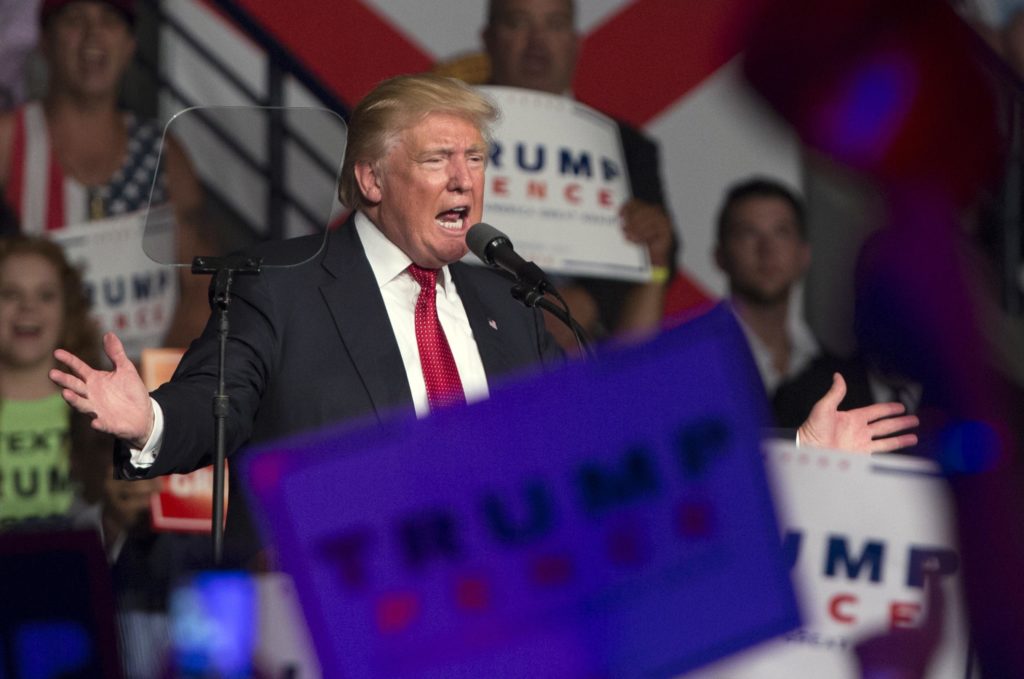
Donald Trump is underwriting his presidential bid by selling the Donald Trump lifestyle — and campaign finance records show it is working. For the low price of $25, you can snag a Trump Gold Card emblazoned with your name or join a campaign “Board of Directors” that comes with a personalized certificate. For $30, grab one of Trump’s signature red hats — billed as “the most popular product in America.” Supporters can elevate themselves to “big league” by ponying up $184 for a signed, “now out of print” copy of Trump’s book, “The Art of the Deal.” There’s a catch to some of these merchandising claims. There is no evidence the board of directors exists. “The Art of the Deal” is still in print, available for $9.34 in paperback. And the new campaign edition of the book is signed by an autopen, not Trump, as noted in the solicitation’s fine print. Regardless, the appeals have paid off. Through the end of July, people giving $200 or less made up about half of his campaign funds, according to fundraising reports through July. For Democratic nominee Hillary Clinton, those small gifts accounted for about 19 percent. The two candidates each claim over 2 million donors, but Trump has been fundraising in earnest for only about three months, compared to Clinton’s 17-month operation. Both are expected to report the details of their August fundraising to federal regulators on Tuesday. “His brand appeals to quite a number of people,” said John Thompson, digital fundraising director for Ted Cruz‘s Republican presidential campaign. “It’s smart for him to use it for fundraising. The celebrity factor builds a natural donor community on its own, without him having to do too much.” Hyperbolic campaign marketing is a natural fit for Trump, who has puffed up the value of what he sold throughout his business career. At times, Trump has offered golf memberships or Trump University seminars at a “discount” from an imaginary, inflated price; and he has declared condo projects close to selling out when in reality they were struggling. “You want to say it in the most positive way possible,” Trump once told attorneys who asked him whether he had ever lied about his properties to sell them. “I’m no different from a politician running for office.” Perhaps it is no surprise, then, that his campaign has adopted that same approach, outspending Clinton on campaign merchandise while running a brisk retail operation that helps him raise the money for, among other things, crucial get-out-the-vote efforts and advertising to spread his message. Trump’s appeals for smaller contributions are reminiscent of Bernie Sanders, whose signature line in the Democratic primary this year was that his campaign was paid for by $27 donations. Sanders’ digital fundraiser, Michael Whitney, questioned whether Trump’s small donor haul would continue since it does not appear the campaign has done much to get email addresses that could be turned into fresh batches of new potential donors. “This feels more like a battering ram than a well-thought-out digital program,” Whitney said. One of Trump’s most frequent fundraising offers has been a “gold card” that identifies the holder as an Executive Member for a “one-time induction fee.” “In the past, I have asked supporters for a one-time induction fee of $100. But because of your outstanding generosity to date, I am only asking you to make a $35 contribution,” the email asks. The Associated Press found no evidence of an online solicitation in which the card was sold for the undiscounted price of $100. The gold card offer is reminiscent of a Trump Visa card that became available in 2004. In a press release for it, Trump pitched it as “the best deal” and warned declining it “could get you fired.” Trump also seeks to make would-be donors feel like part of the campaign. Several emails have sought “campaign advice,” asked for help with debate preparation and even offered people the chance to join a campaign “board of directors.” There’s no evidence such a board exists, and the campaign did not respond to questions about it. But the gold card and executive board membership gimmicks are getting results, said Tom Sather, senior director of research at the email data solutions firm Return Path. The firm measures emails much the way Nielsen measures television viewership, by extrapolating from a large panel of study participants. Emails from the Trump campaign and Trump joint committees with the Republican Party have an average open rate of 11 percent, Sather said. The 10 gold card-related emails had a far higher open rate of 18 percent, and executive board emails had an open rate of 19 percent, he said. “These kinds of offers intrigue people and make them feel exclusive and special,” he said. Ever the marketer, Trump has also dominated the campaign swag front. In April, May and June, Trump spent about $3 million on merchandise that’s then sold to donors, an AP review of campaign finance reports found. Clinton’s operation spent about $2 million in the same time period. Republished with permission of the Associated Press.
Donald Trump signed improper charity check supporting Florida AG Pam Bondi
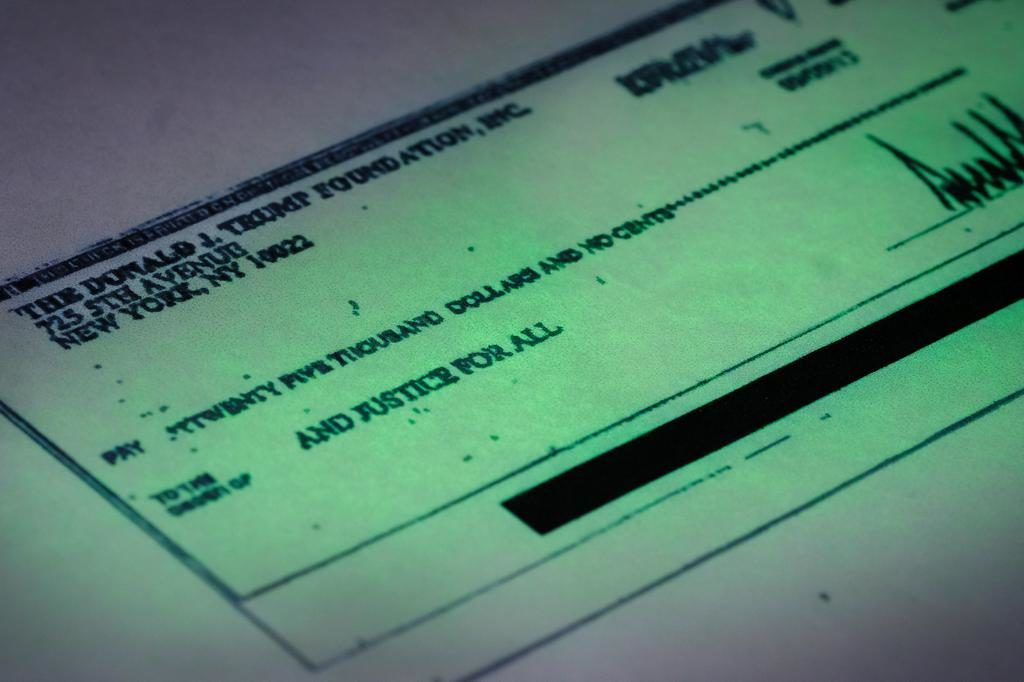
Donald Trump‘s signature, an unmistakable if nearly illegible series of bold vertical flourishes, was scrawled on the improper $25,000 check sent from his personal foundation to a political committee supporting Florida Attorney General Pam Bondi. Charities are barred from engaging in political activities, and the Republican presidential nominee’s campaign has contended for weeks that the 2013 check from the Donald J. Trump Foundation was mistakenly issued following a series of clerical errors. Trump had intended to use personal funds to support Bondi’s re-election, his campaign said. So, why didn’t Trump catch the purported goof himself when he signed the foundation check? Trump lawyer Alan Garten offered new details about the transaction to The Associated Press on Thursday, after a copy of the Sept. 9, 2013, check was released by New York Attorney General Eric Schneiderman. Garten said the billionaire businessman personally signs hundreds of checks a week, and that he simply didn’t catch the error. “He traditionally signs a lot of checks,” said Garten, who serves as in-house counsel for various business interests at Trump Tower in New York City. “It’s a way for him to monitor and keep control over what’s going on in the company. It’s just his way. … I’ve personally been in his office numerous times and seen a big stack of checks on his desk for him to sign.” The 2013 donation to Bondi’s political group has garnered intense scrutiny because her office was at the time fielding media questions about whether she would follow the lead of Schneiderman, who had then filed a lawsuit against Trump University and Trump Institute. Scores of former students say they were scammed by Trump’s namesake get-rich-quick seminars in real estate. Bondi, whom the AP reported in June personally solicited the $25,000 check from Trump, took no action. Both Bondi and Trump say their conversation had nothing to do with the Trump University litigation, though neither has answered questions about what they did discuss or provided the exact date the conversation occurred. House Democrats called earlier this week for a federal criminal investigation into the donation, suggesting Trump was trying to bribe Bondi with the charity check. Schneiderman, a Democrat, said he was already investigating to determine whether Trump’s charity broke state laws. Garten said the series of errors began after Trump instructed his staff to cut a $25,000 check to the political committee supporting Bondi, called And Justice for All. Someone in Trump’s accounting department then consulted a master list of charitable organizations maintained by the IRS and saw a Utah charity by the same name that provides legal aid to the poor. According to Garten, that person, whom he declined to identify by name, then independently decided that the check should come from the Trump Foundation account rather than Trump’s personal funds. The check was then printed and returned for Trump’s signature. After it was signed, Garten said, Trump’s office staff mailed the check to its intended recipient in Florida, rather than to the charity in Utah. Emails released by Bondi’s office show her staff was first contacted at the end of August by a reporter for The Orlando Sentinel asking about the Trump University lawsuit in New York. Trump’s Sept. 9 check is dated four days before the newspaper printed a story quoting Bondi’s spokeswoman saying her office was reviewing Schneiderman’s suit, but four days before the pro-Bondi political committee reports receiving the check in the mail. Compounding the confusion, the following year on its 2013 tax forms the Trump Foundation reported making a donation to a Kansas charity called Justice for All. Garten said that was another accounting error, rather than an attempt to obscure the improper donation to the political group. In March, The Washington Post first revealed that that the donation to the pro-Bondi group had been misreported on the Trump Foundation’s 2013 tax forms. The following day, records show Trump signed an IRS form disclosing the error and paying a $2,500 fine. Bondi has endorsed Trump’s presidential bid and has campaigned with him this year. She has said the timing of Trump’s donation was coincidental and that she wasn’t personally aware of the consumer complaints her office had received about Trump University and the Trump Institute, a separate Florida business that paid Trump a licensing fee and a cut of the profits to use his name and curriculum. Neither company was still offering seminars by the time Bondi took office in 2011, though dissatisfied former customers were still seeking promised refunds. Republished with permission of the Associated Press.
Donald Trump and Hillary Clinton turn to battleground states in the South
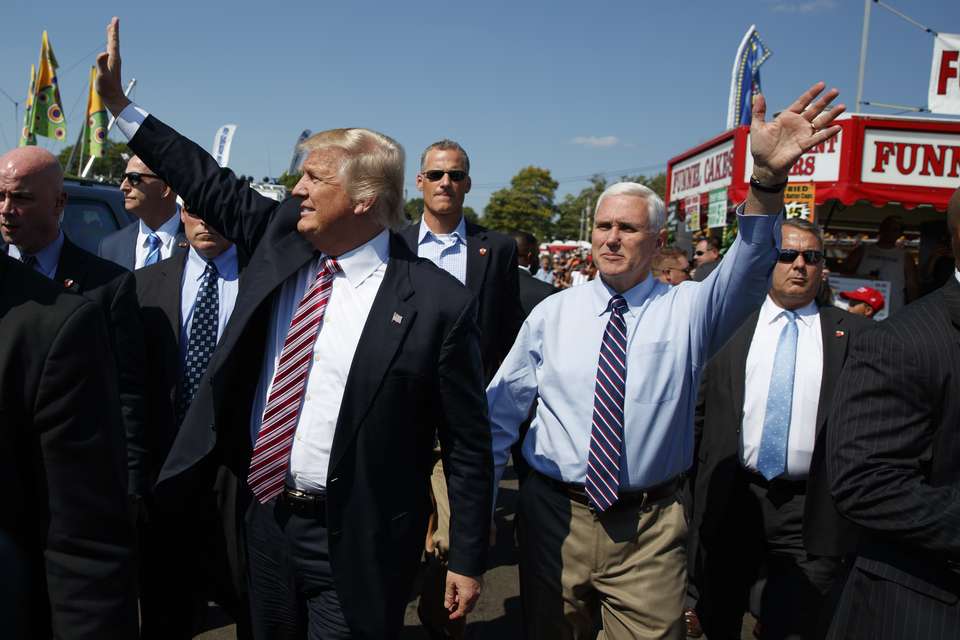
With Labor Day behind them, Donald Trump and Hillary Clinton are pushing ahead in top presidential battlegrounds in the South. Trump, the Republican nominee, is set to campaign in Virginia and North Carolina on Tuesday, two critical states in his path to the presidency. Clinton, the Democrat, is campaigning in Florida in search of an advantage in the nation’s largest swing state. A Clinton victory in Florida would make it virtually impossible for Trump to overcome her advantage in the race for 270 electoral votes. The day before in swing state Ohio, Trump softened his stance on immigration while Clinton blasted Russia for suspected tampering in the U.S. electoral process. In a rare news conference aboard her new campaign plane, Clinton said she is concerned about “credible reports about Russian government interference in our elections.” “We are going to have to take those threats and attacks seriously,” Clinton told reporters traveling with her from Ohio to Illinois. Clinton’s comments follow reports that the Russian government may have been involved in the hacking of Democratic National Committee emails just days before the party’s national convention. The emails, later revealed by WikiLeaks, showed some DNC officials favoring Clinton over her primary opponent, Bernie Sanders — who has since endorsed Clinton for president. She said Russian President Vladimir Putin appears “quite satisfied with himself” and said Trump “has generally parroted what is a Putin-Kremlin line.” Meanwhile, Trump extended a rare invitation to journalists to accompany him on his private plane from Cleveland to Youngstown, Ohio. The billionaire businessman appeared to shy away from his hard-line vow to block “amnesty” for immigrants in the country illegally. Any immigrants who want full citizenship must return to their countries of origin and get in line, he told reporters — but he would not rule out a pathway to legal status for the millions living in the U.S. illegally, as he did in a long-awaited policy speech last week. “We’re going to make that decision into the future,” Trump said. Clinton powered through a coughing fit at a Labor Day festival at a Cleveland park, sharply criticizing Trump’s recent trip to Mexico as “an embarrassing international incident.” Unwilling to allow Trump to modify his immigration stances, she said his address later that night in Arizona amounted to a “doubling down on his absurd plan to send a deportation force to round up 16 million people.” “He can try to fool voters into thinking somehow he’s not as harsh and inhumane as he seems, but it’s too late,” Clinton said. The former secretary of state flatly said “No,” when asked in an ABC News interview whether she’d be willing to accept the Mexican president’s invitation to visit the country, as Trump did last week. “I’m going to continue to focus on what we’re doing to create jobs here at home,” Clinton said. Earlier in the day, Trump attacked Clinton’s energy level, noting she hasn’t followed his aggressive traveling schedule and questioning whether she had the stamina to help bring jobs back to America. “She doesn’t have the energy to bring ’em back. You need energy, man,” Trump told reporters. He added, “She didn’t have the energy to go to Louisiana. And she didn’t have the energy to go to Mexico.” Clinton’s 25-minute question-and-answer session was her first extensive availability with reporters since early December. Beyond Russia, she answered questions about the ongoing controversy surrounding her use of a private email server while secretary of state, which Trump has used to cast doubt over her ability to protect classified information. “I take classification seriously,” she said. While Labor Day has traditionally been the kickoff to the fall campaign, both Clinton and Trump have been locked in an intense back-and-forth throughout the summer. The start of full-fledged campaigning opens a pivotal month, culminating in the first presidential debate Sept. 26 at Hofstra University in Hempstead, New York. Polls show Trump trailing Clinton in a series of must-win battleground states, meaning the debates could be his best chance at reorienting the race. Trump told reporters he does plan to take part in all three presidential debates, joking that only a “hurricane” or “natural disaster” would prevent him from attending. Republished with permission of the Associated Press.
What’s on Hillary Clinton’s to-do list before Election Day?
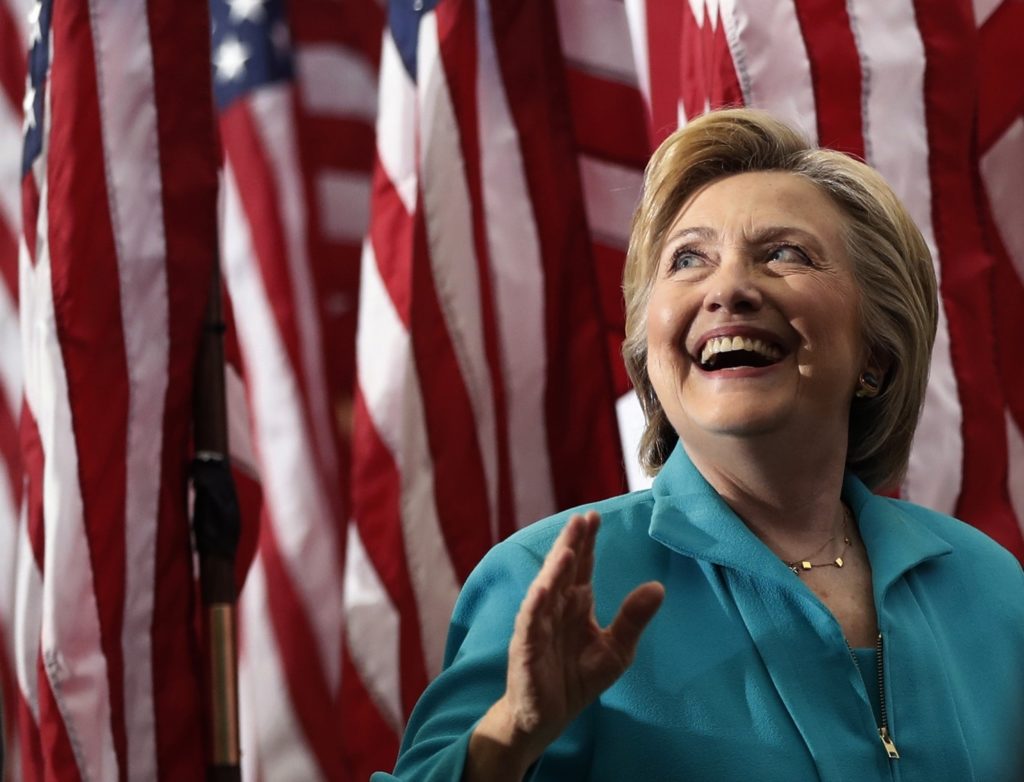
Hillary Clinton will celebrate Labor Day with an edge over rival Donald Trump in any number of the most competitive states, even as she struggles with the challenge of sealing the deal with large groups of voters who consider her dishonest and untrustworthy. Clinton’s experience as secretary of state and her handle on domestic policy make her the favorite in three presidential debates beginning later this month. She has appeared in more than 30 as a presidential candidate in 2008 and 2016. But she still has work to do. A look at Clinton’s Labor Day to Election Day to-do list: DOMINATE THE DEBATES Millions of voters will watch the debates, which offer her an opportunity and a challenge. She needs to prepare for a candidate who’s the most unpredictable nominee in decades. She also needs to prevent Trump from using the televised forums to present himself as a plausible commander in chief, and from turning them into referendums on President Barack Obama’s two terms and Clinton’s decades in politics. Clinton acknowledges that the debates could be pivotal. She told donors last weekend, “Somebody said to me, ‘Well, remember, there’ll be a lot of people watching.’ One hundred million people watching. And 60 million will be paying attention to the campaign for the first time.” CHART A PATH TO 270 Clinton has an edge in most of the highly contested states, the roughly dozen or so where the election will be decided. Her campaign is trying to keep open as many paths as possible through those states to reach the decisive 270 electoral votes needed to win. She enters the fall with a decided advantage, both in terms of history and in this year’s campaign. If Clinton can hold onto the set of states that every Democratic presidential nominee has won since 2000, she starts with 242 electoral votes. Beyond those states, preference polls show her ahead in Virginia and Colorado, and competing in close contests in North Carolina, Florida and Ohio. Applying pressure on Trump, Clinton is advertising in GOP-leaning Arizona and in an Omaha, Nebraska, congressional district. If Clinton can keep open as many routes to victory, she will make it difficult for Trump to chart a way to 270. That will make it hard for him to convince fellow Republicans who are worried about maintaining their congressional majorities that he can win. EXPECT THE UNEXPECTED Clinton’s campaign is bracing itself for some type of ‘October surprise” — an unexpected event that requires the nominee to adjust in the pressure-cooker of the campaign’s final days. Clinton must be able to deftly deal with such a development, and there are plenty of contenders on the horizon. The State Department is expected to release some of the 15,000 emails from Clinton’s time there that have yet to be made publicly available. WikiLeaks has threatened to release more damaging information before the end of the election. She’ll need to make sure any new revelations don’t further damage the public’s view of Clinton, which isn’t particularly strong for a candidate seen as ahead on Labor Day. TURNOUT, TURNOUT, TURNOUT Clinton’s campaign needs to maximize voter turnout among members of the “Obama coalition” — the legions of black, Latino, unmarried women and young voters who powered him to two decisive victories. Trump has sought in recent days to turn around his dismal standing among minorities. But the negative tone of the campaign could dampen turnout and make Clinton’s task more difficult. Clinton also aims to make the most of early voting in a number of critical states, replicating a strategy that worked well for Obama. She will have plenty of help: Obama and Vice President Joe Biden are hitting the road on her behalf and she can also rely on her husband, former President Bill Clinton. TRUSTWORTHINESS Questions about Clinton’s honesty and trustworthiness have dogged her throughout the campaign and she can ill afford to have more voters view her in a negative way. Her saving grace during the campaign has been Trump’s high negative ratings, untrustworthiness and penchant for saying provocative things that have turned off many voters. But more revelations about her private email server or the Clinton Foundation could reinforce the perception that she’s not trustworthy. On Friday, the FBI released notes from its investigation of her email use as secretary of state. It’s the kind of day Clinton needs to avoid. Even if she wins in November, this is a problem could haunt Clinton in the White House. That’s why she needs to start chipping away at her trust deficit now, so that if elected, she will have some public goodwill as she tries to lead the nation and work with Congress. Clinton could find it difficult to enact her agenda if questions about her honesty linger as president. Republished with permission of the Associated Press.
Venturing to Mexico, Donald Trump defends right to build huge wall

On Mexican soil for the first time as the Republican presidential nominee, a firm but measured Donald Trump defended the right of the United States to build a massive border wall along its southern flank, standing up for the centerpiece of his immigration plan in a country where he is widely despised. Trump, who previously derided Mexico as a source of rapists and criminals, praised Mexicans Wednesday as “amazing people” following a closed-door meeting at the official residence of the country’s president, Enrique Pena Nieto. Trump and the Mexican president, who has compared the New York billionaire to Adolf Hitler, addressed reporters from adjacent lecterns before a Mexican flag. The trip, 10 weeks before America’s presidential Election Day, came just hours before Trump was to deliver a highly anticipated speech in Arizona about illegal immigration. That has been a defining issue of his presidential campaign, but also one on which he’s appeared to waver in recent days With political risks high for both men, Trump stayed on script, declining to repeat his promise to force Mexico to pay for a wall along the border between the two countries when pressed by reporters. While he and Pena Nieto talked about the wall, Trump said they didn’t discuss who would pay for a cost of construction pegged in the billions. “Having a secure border is a sovereign right and mutually beneficial,” Trump said, reading from prepared remarks. “We recognize and respect the right of any country to build a physical barrier or wall on any of its borders to stop the illegal movement of people, drugs and weapons. Cooperation toward achieving this shared objective — and it will be shared — of safety for all citizens is paramount to both the United States and to Mexico.” Trump’s presence on Wednesday, his first meeting with a head of state abroad as a presidential candidate, sparked anger and protests across Mexico’s capital city. Former Mexican President Vicente Fox bluntly told the celebrity businessman that, despite Pena Nieto’s hospitality, he was not welcome. “We don’t like him. We don’t want him. We reject his visit,” Fox said on CNN, calling the trip a “political stunt.” Pena Nieto was less combative as he addressed reporters alongside Trump. He acknowledged the two men had differences and defended the contribution of Mexicans working in the United States, but he described the conversation as “open and constructive.” He and Trump shook hands as the session ended. Pena Nieto’s performance came in for immediate condemnation from his many critics in Mexico. “Pena ended up forgiving Trump when he didn’t even ask for an apology,” said Esteban Illades, the editor of Nexos magazine. “The lowest point of the most painful day in the history of the Mexican presidency.” After saying during his Republican primary campaign he would use a “deportation force” to expel all of the estimated 11 million people living in the United States illegally, Trump suggested last week he could soften that stance. But he still says he plans to build a huge wall — paid for by Mexico — along the two nations’ border. He is under pressure to clarify just where he stands in the Wednesday night speech, which had been rescheduled several times. Trump’s running mate, Indiana Gov. Mike Pence, told CBS earlier in the day that Trump would make clear “that there will be no path to legalization, no path to citizenship. People will need to leave the country to be able to obtain legal status or obtain citizenship.” The buildup to the speech was abruptly interrupted Tuesday night by the news that Trump would visit Mexico, accepting on short notice an invitation offered last week by Pena Nieto. The newspaper El Universal wrote in an editorial that Trump “caught Mexican diplomats off guard.” Campaigning in Ohio earlier in the day, Democrat Hillary Clinton jabbed at Trump’s Mexican appearance as she promoted her own experience working with foreign leaders as the nation’s chief diplomat. “People have to get to know that they can count on you, that you won’t say one thing one day and something totally different the next,” she told the American Legion in Cincinnati. “And it certainly takes more than trying to make up for a year of insults and insinuations by dropping in on our neighbors for a few hours and then flying home again.” Trump has promised, if elected, to deport millions of immigrants who are in the United States illegally, force Mexico to pay for the construction of a wall to secure the nearly 2,000-mile border and renegotiate the NAFTA trade agreement to make it more favorable to the United States. Pena Nieto suggested there was room to improve the trade deal, which Trump described as unfair to American workers. The New York businessman promised to promote trade deals that would keep jobs in the Western Hemisphere. Pena Nieto made his invitation to both Trump and Clinton, who met with him in Mexico in 2014. The inclusion of Trump puzzled many in Mexico, who said it wasn’t clear why their own unpopular president would agree to meet with someone so widely disliked in his country. Pena Nieto has been sharply critical of Trump’s immigration policies, particularly the Republican’s plans to build a wall and have Mexico pay for it. In a March interview, he said that “there is no scenario” under which Mexico would do so and compared Trump’s language to that of dictators Hitler and Benito Mussolini. Pena Nieto did not repeat such criticism on Wednesday, but acknowledged Trump’s comments had “hurt and affected Mexicans.” “The Mexicans deserve everyone’s respect,” he said. Republished with permission of The Associated Press.
As Hillary Clinton asks for money, what she says remains a mystery
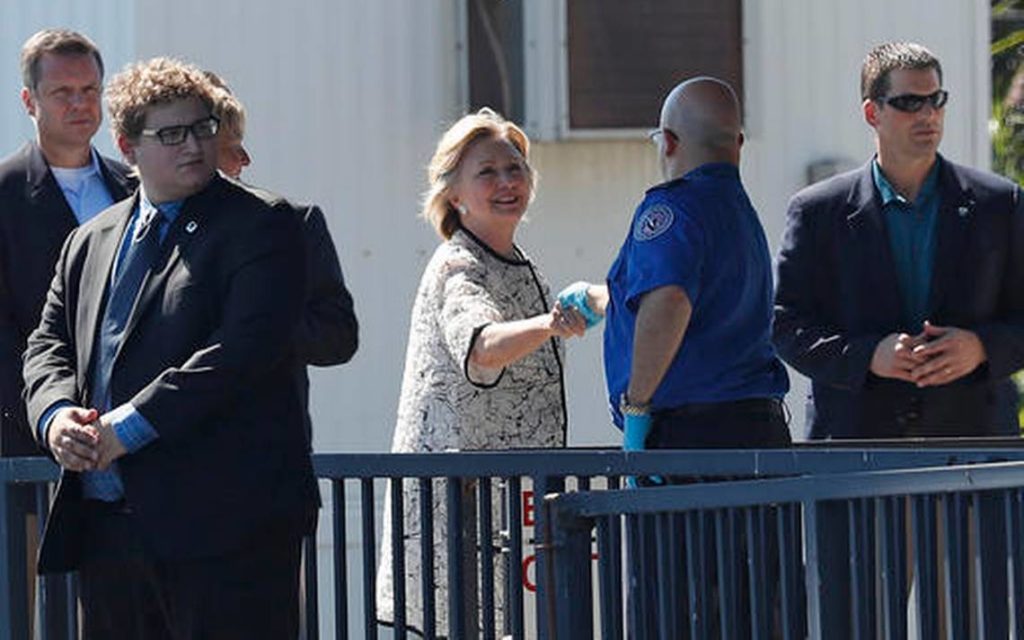
It was a very busy, very lucrative weekend for Hillary Clinton in the summer playground of the East Coast’s moneyed elite. She brunched with wealthy backers at a seaside estate in Nantucket, snacking on shrimp dumplings and crab cakes. A few hours later, she and her husband dined with an intimate party of thirty at a secluded Martha’s Vineyard estate. And on Sunday afternoon, she joined the singer Cher at an “LGBT summer celebration” on the far reaches of Cape Cod. By Sunday evening, Clinton had spoken to more than 2,200 campaign donors. But what she told the crowds remains a mystery. Clinton has refused to open her fundraisers to journalists, reversing nearly a decade of greater transparency in presidential campaigns and leaving the public guessing at what she’s saying to some of her most powerful supporters. It’s an approach that differs from the Democratic president she hopes to succeed. Since his 2008 campaign, President Barack Obama has allowed reporters traveling with him into the backyards and homes of wealthy donors to witness his some of his remarks. While reporters are escorted out of Obama’s events before the start of the juicier Q&A, the president’s approach offers at least a limited measure of accountability that some fear may disappear when Clinton or Republican nominee Donald Trump moves into the White House. “Unfortunately these things have a tendency to ratchet down,” said Larry Noble, the general counsel of the nonprofit Campaign Legal Center. “As the bar gets lower, it’s hard to raise it again.” Clinton’s campaign does release limited details about her events, naming the hosts, how many people attended and how much they gave. That’s more than Trump, whose far fewer fundraisers are held entirely away from the media, with no details provided. Even some Democrats privately acknowledge that Clinton’s penchant for secrecy is a liability, given voters continued doubts about her honesty. While Clinton will occasionally take questions from reporters at campaign stops, she has not held a full-fledged news conference in more than 260 days. Trump has held several. She refuses to release the transcripts of dozens of closed-door speeches she delivered to companies and business associations after leaving the State Department, despite significant bipartisan criticism. And since announcing her presidential bid in April 2015, Clinton has held around 300 fundraising events — only around five have been open to any kind of news coverage. “It does feed this rap about being secretive and being suspicious,” said GOP strategist Whit Ayers. Clinton’s aides have promised for weeks that greater access to her events will be coming soon. But Trump’s lack of disclosure has given her political cover to keep the doors closed, particularly as she conducts a period of intense fundraising before the final sprint to Election Day. While Clinton is expected to make only two public appearances before the end of August, she and her top backers will mingle with donors at no fewer than 54 events according to a fundraising schedule obtained by The Associated Press. Reporters covering these events wait outside, in vans, parking lots and vacant guesthouses — even at homes they’ve entered with Obama at previous events. In Provincetown on Sunday, five reporters crowded into the corner of a parking lot, clinging to a chain-link fence as they tried to catch Clinton’s speech to a crowd of about 1,000 supporters. None of her remarks seemed particularly remarkable: The candidate could faintly be heard running through her standard stump speech. During a Saturday fundraiser at a stately Martha’s Vineyard estate, faint cheers could be heard as Clinton addressed 700 donors on a green lawn overlooking the water. Staffers instructed drivers to roll up the windows of the vans where reporters waited before being ushered into a nearby guesthouse. What a candidate tells his or her rich donors has long been a subject of intense speculation in American politics, in part because the message can be different from what they offer to voters. Obama is still haunted by a comment he made at a 2008 fundraiser in San Francisco, calling voters in small town Pennsylvania “bitter” and saying they cling to “guns or religion.” He learned a lesson: At events during his 2012 campaign, staffers set up a table where guests were expected to check their cellphones before entering. Clinton has tried to ban tweeting, Instagram and other forms of social media at some of her events. Four years ago, a waiter recorded and leaked remarks GOP nominee Mitt Romney made about the “47 percent” of voters who are “dependent on government and would vote for Obama “no matter what” at a closed Florida fundraiser. After his convention, Romney started opening his fundraisers to the media to grab headlines, especially on days when he had no other public appearances. His former aides say that’s not a problem for Clinton. “Quite frankly, if I’m her, it may not be a bad thing to let Donald Trump be the only candidate making news on any given day,” said former Romney campaign aide Ryan Williams. “She can stay dark for five straight days and let Trump trip all over himself.” ___ Keep track of how much Clinton and Trump are spending on television advertising, and where they’re spending it, via AP’s interactive ad tracker https://elections.ap.org/content/ad-spending. Republished with permission of The Associated Press.
Donald Trump and new team have little time to execute new strategy

Donald Trump is on the clock. He has about 80 days to reset and rally a presidential campaign that’s done little but stagger since the close of the Republican convention. The GOP nominee’s allies say the celebrity businessman and his new leadership team are “laser-focused” and ready to direct the billionaire’s venom against Democratic Hillary Clinton. “This has been one of the best weeks the campaign has had,” said Sean Spicer, chief strategist at the Republican National Committee. For much of the past year, Trump has ignored the tools of modern-day presidential campaigns. That’s a big reason why Trump’s Republican critics are skeptical their party’s nominee has the time or discipline to rescue his struggling White House bid. “The Trump campaign is at a ludicrously high disadvantage,” said Dan Senor, a former adviser to 2012 GOP nominee Mitt Romney and House Speaker Paul Ryan, R-Wis. “The Democrats have something that the Republicans don’t: They have a nominee that’s built a real campaign organization.” While Trump did bring in a new set of advisers in the past week, it appears all but certain his comeback strategy cannot benefit from the proven building blocks of winning campaigns, especially when compared with the structure Clinton has assembled. Trump has few loyal staffers devoted to his election working in the tightly contested states that will decide the election; little early investment in the data operation needed to help ensure his supporters vote; and no significant effort to take advantage of early voting, which begins next month in some states. If not for the Republican National Committee’s staff, Trump would have a skeleton presence in the most competitive states. Only in the past week did Trump place his first round of general election advertising — nearly $5 million for TV commercials in Florida, Ohio, Pennsylvania and North Carolina. By contrast, Clinton’s campaign has spent more than $75 million on ads in the weeks since she effectively locked up the nomination in early June, according to Kantar Media’s political ad tracker. Out of time to build a campaign to match Clinton’s, the team at Trump Tower will by necessity focus on a broad messaging effort to capture the attention of voters and try to highlight Clinton’s shortcomings. For now, Trump finds himself behind Clinton in preference polls in nearly every battleground state. “This new team will be very, very aggressive. They understand the nature of taking on the left,” said former House Speaker Newt Gingrich, a Trump ally. “They will be on the attack.” That team includes Stephen Bannon, a combative conservative media executive with no presidential campaign experience, and pollster Kellyanne Conway, who has known Trump for years. The campaign chairman, Paul Manafort, resigned on Friday amid scrutiny of his past work for Ukraine’s former pro-Russian political leaders. Bannon and Conway will have money to work with. In July, Trump raised more than $80 million for his campaign and allied Republican Party groups, his campaign has said. That’s just shy of the $90 million that Clinton’s aides said the nominee collected in July for her campaign and fellow Democratic committees. The goal for the Trump campaign’s leaders is not to tame the candidate’s passion, according to Trump’s allies, but refocus his attacks on Clinton. The hope is that Trump can avoid the missteps that have defined his campaign since the end of the conventions, including a public feud with an American Muslim family whose son was killed while serving in the military in Iraq. “Unfortunately, it took them two months to figure out that Donald Trump is Donald Trump,” former Trump adviser Barry Bennet said of Manafort and his team. “He’s the bulldozer candidate. What you need to do is aim him at an immovable object, not try to change him.” That approach was evident Friday. Trump began with a visit to flood-wreaked Louisiana and ended with a measured, but pointed rally in Michigan. He took on Clinton and her strong support among African-Americans, and contended that his rival would rather give jobs to refugees than American citizens. Trump accused Democrats of taking advantage of black voters while failing to offer them new jobs, better schools and a way out of poverty. “It’s time to hold Democratic politicians accountable for what they’ve done for these communities,” he said, adding: “What do you lose by trying something new like Trump?” Clinton had no intention of letting Trump’s messages pass politely. Within hours of his speech, she tweeted: “This is so ignorant it’s staggering.” Republished with permission of the Associated Press.
Unfriended? Divisive presidential campaign roils Facebook
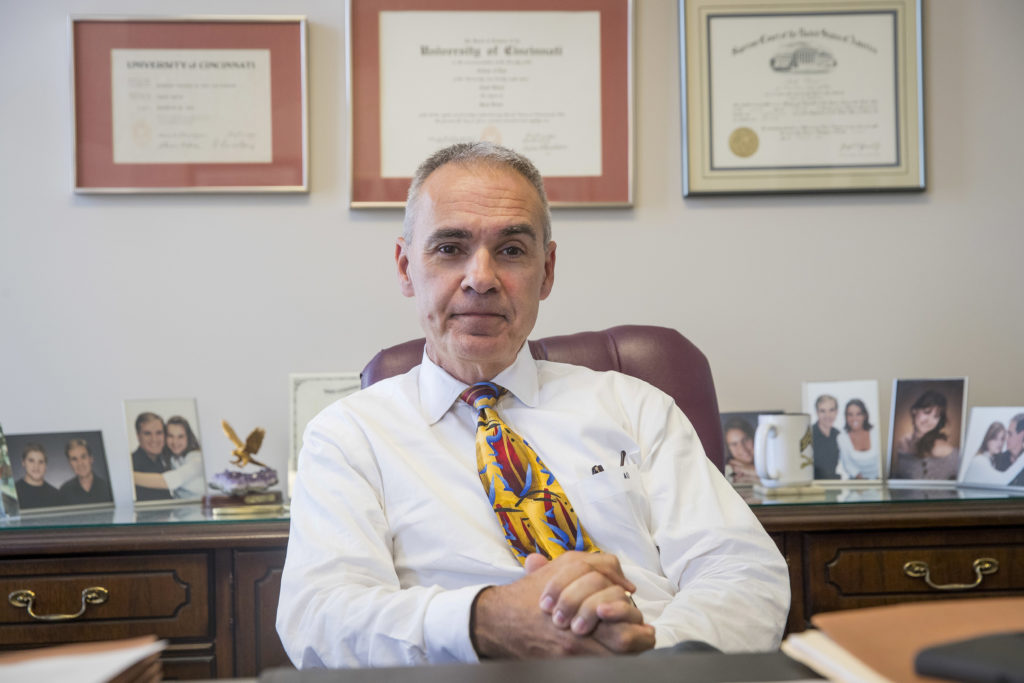
Some friends don’t let friends talk politics anymore on Facebook. Others are on “unfriending” sprees. And some, such as Adolfo Olivas of Hamilton, Ohio, have decided to just shut down their accounts, as the divisive presidential campaign causes a deluge of news feeds amid photos of smiling kids’ first day of school and what’s on the grill for dinner. The last straw for the former Republican mayor came after GOP nominee Donald Trump‘s criticism of fellow Gold Star parents, the Muslim parents of Iraq war casualty Humayun Khan. “Just reading all of those comments justifying Mr. Trump’s outbursts,” explained Olivas, whose son Nicholas, 20, was killed on Army patrol in Afghanistan in 2012. “I cannot stand to put up with the stupidity of those who will try to justify those words!” The giant social network has emerged as a virtual town hall for political debate, an easy place to share opinions — and vitriolic attacks — about the two polarizing presidential candidates. Facebook says that from Jan. 1 through Aug. 1, 100 million people on Facebook in the United States generated 4 billion posts, comments, shares and reactions about the election. More than 1 billion of those came in July, the month of the national conventions officially nominating Trump and Democrat Hillary Clinton. Facebook counts 205 million active monthly users in the United States. Katie Harbath, Facebook’s global politics and government outreach director, said in a statement that the network “is giving more people a voice in the political process, enabling a robust two-way dialogue between candidates and voters the likes we haven’t seen before.” Facebook didn’t have “unfriending” numbers, but that online action of cutting off communication appears to be on the rise this summer along with the other election-related activity. “I’ve seen that myself increasingly,” said Scott Talan, an American University communication teacher who studies social media and politics. “They range from pretty harsh, graphically laced, attacks upon people … to statements of ‘if you support this person, you can no longer be my friend.’” Talan says the popularity and ease of use on Facebook combined with two candidates with remarkably high negative ratings among voters fuel “very visceral” debates that go to people’s strong personal values and identity. Joseph Alfini, 62, of Sarasota, Florida, is among users who have declared Facebook moratoriums: no more politics! “I am done with political posts; negative, harmful words back and forth,” Alfini wrote recently. “Some people are real brave sitting behind a keyboard. Everyone should be able to vote (for) who they want to without influence and negativity.” The New York native says he “would never” vote for Clinton, but isn’t a fan of Trump. “They both suck,” said Alfini, whose latest posts have focused on the Yankees, Mets, and this by the Chi-Lites: https://bit.ly/2bi3YQt Talan said on the bright side, the lively Facebook debates are healthy signs of Americans exercising their free speech rights and of voter engagement in the political process. Among his suggestions: — Try to use civilized tones and decorum in your posts. — “Take a breath or two” and think it through before commenting on a friend’s post or unfriending someone. — Instead of sharp opinion statements, pose questions such as “how can we trust her?” or “is he stable enough to be president?” — Remember that this will all be over in November, and your friendships could and should outlast the next presidential term. — And, in general, “try not to be like the candidates.” Republished with permission of the Associated Press.
Donald Trump, former campaign aide settle confidentiality dispute
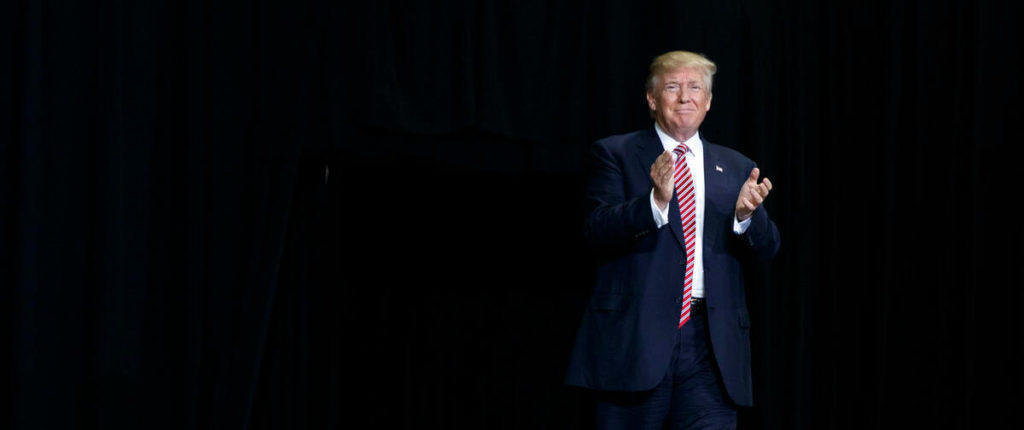
Donald Trump has settled a $10 million legal dispute with a former political consultant he had accused of violating a nondisclosure agreement. Terms of the settlement, which included a counter lawsuit against Trump, were confidential. The decision brings to a close the latest move by the GOP presidential nominee to aggressively enforce terms of confidentiality agreements he requires nearly every employee to sign. Trump had sought $10 million in damages from Sam Nunberg after accusing the former aide of leaking information to reporters after Nunberg was fired. In response, Nunberg filed a lawsuit in New York state court, accusing Trump of trying to silence him because he chose to support Texas Sen. Ted Cruz in the GOP primary. The details of the settlement were not disclosed in court papers, and attorneys on either side declined to provide further details. “All I can say it that it was amicably resolved, the whole dispute,” said Alan Garten, general counsel for the Trump Organization. Nunberg’s attorney, Andrew Miltenberg, issued a similar statement in an email to The Associated Press. Nunberg did not immediately respond to an email requesting comment. Republished with permission of the Associated Press.
Hillary Clinton campaign reports 34.2 percent tax rate
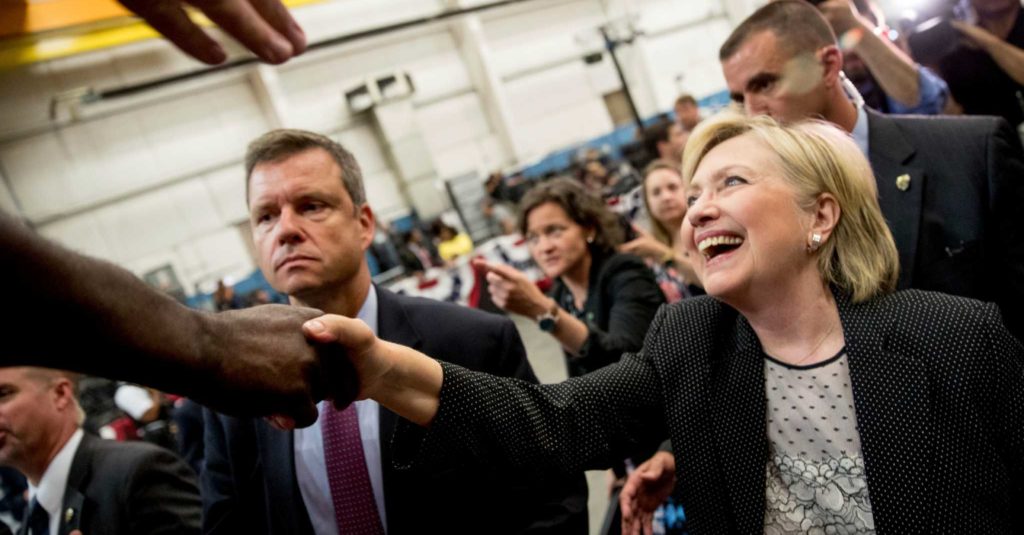
Hillary Clinton‘s campaign says the Democratic nominee and her husband paid a federal tax rate of 34.2 percent and donated 9.8 percent of their income to charity last year. The Clintons are releasing their 2015 filings on Friday. Her campaign is also releasing returns from running mate Tim Kaine and his wife. The campaign says the Kaines have donated 7.5 percent of their income to charity over the last decade. They paid an effective tax rate of 25.6 percent in 2015. Clinton is trying to undercut the trustworthiness of rival Donald Trump. He has refused to disclose any returns, breaking tradition with all recent presidential candidates. Trump says he won’t release them until Internal Revenue Service completes audits of his returns. The Clintons have disclosed returns for every year since 1977. Republished with permission of the Associated Press.


